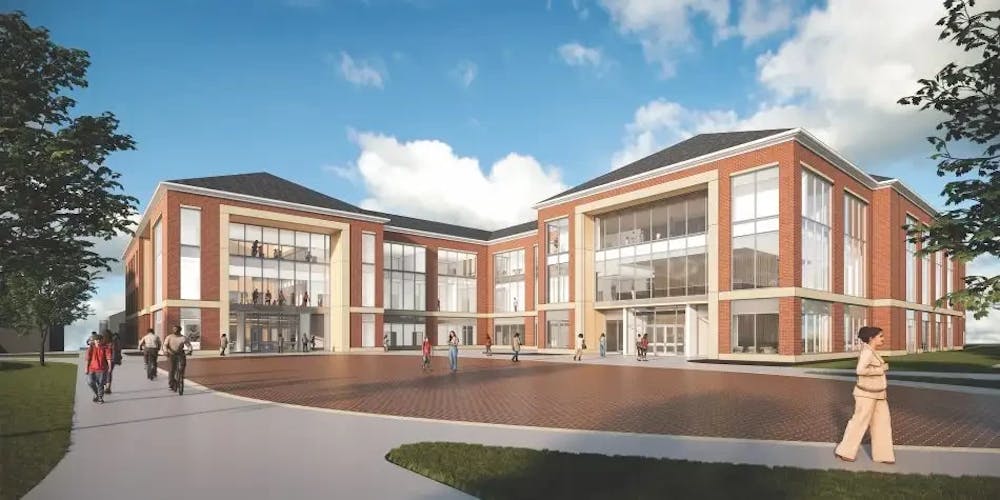Updated as of 11:55 a.m. on April 24 to include video.
Redshirt freshman Lawson Wheeler is one of two players representing Elon University’s baseball team on the Student Athletic Advisory Committee.
The advisory committee meets with HealthEU once a month to go over topics such as wellbeing events, Wheeler said.
“I think with what they’ve done so far, it’s pretty cool to see how they’re kind of promoting wellbeing for everyone on campus, and for our group,” Wheeler said.
Elon HealthEU has always aimed to help all students develop a positive wellbeing both physically and mentally. Part of this initiative will also be seen in Elon’s new HealthEU Center, scheduled to open in summer 2026, according to a press release from the university. The planned 135,000 square-foot facility is rooted in HealthEU’s initiatives and will include space for academics focused on things such as wellness, labs and research. Counseling services will also move to the new building along with new campus reaction and fitness facilities.
The work HealthEU has been doing also applies toward Elon’s athletic teams.
Jana Lynn Patterson has particularly overseen plenty of HealthEU’s work. Patterson, the associate vice president for student life and the dean of students, is the council co-chair for Elon HealthEU.
“We have a long standing history through working with athletics around wellness and wellbeing,” Patterson said.
Patterson helps organize HealthEU’s approach toward reaching out to student-athletes involves coordinating with the Student-Athlete Advisory Committee along with Counseling Services. She said they have had a long history working with athletics.
“We do mental health support for them through counseling services through some training,” Patterson said. “We also do other kinds of community building support with them, and help them develop a sense of community and purpose.”
The increasing focus on mental health has especially made it important for HealthEU to maintain their goal of connecting to student-athletes’ wellbeing, Patterson said.
“Student-athletes have performance-based mental health needs,” Patterson said. “We work very diligently with our counseling staff and athletic staff to make sure we are applying the best practice across our mental health policy.”
The coaches of Elon’s athletic teams also go through training for scenarios when their athletes are under stress. Patterson sees it as beneficial since coaches can be prepared for when players are struggling mentally.
“Athletics works really closely with counseling services and Student Care & Outreach to provide that ongoing training and collaboration,” Patterson said.
Wheeler also said both groups hope their collaboration will lead to more community service throughout Elon before the end of the year.
“A lot of stuff that we do is based on community service,” Wheeler said. “There’s been talk about promoting certain things like mental health and nutrition around campus for student-athletes and people in general.”
For game days, services are offered for student-athletes both before and after they compete, Patterson said.
“There are practices so that they can be in the best place mentally when they go out on the field,” Patterson said. “If something didn’t go well for them, we give them a chance to process that in a way that’s healthy.”
It has also caused HealthEU to discuss ways to continue developing some of their practices to make them more effective, Patterson said.
“There are many nuanced pieces that athletics has been doing for years,” Patterson said. “I think with the attention to mental health, we’re thinking what strategies we can take to enhance those practices.”
One of HealthEU’s priorities is incorporating mental health screenings for their athletes, which is a test to determine players are currently feeling and if they are experiencing any symptoms.
While mental health screenings are supposed to test if people are experiencing any problems, Patterson also believes it can allow HealthEU to help students take the necessary steps to develop a positive wellbeing.
“It puts us in a better position not only to provide services in response when folks get into a crisis, but also help us develop positive strategies for addressing their health and wellbeing,” Patterson said.
She recognizes that student-athletes have plenty going on between classes and sporting events. Patterson hopes the abundance of resources connected to HealthEU will provide a necessary outlet for student-athletes.
“Whether it’s mental or physical health, it’s a collaborative effort between student health, Counseling Services and student-athletes to develop strategies to respond to the mental health needs of that student,” Patterson said.
Student-athletes often evaluate potential improvements they would like to see at Elon, Wheeler said. Wheeler believes that HealthEU has a good sense of the responsibilities student-athletes usually face.
“Whether it’s mental health or certain groups coming together, I think what everyone hopes to see is just a lot of improvement in our community,” Wheeler said.
As for the future, Patterson hopes HealthEU’s work with other organizations on campus will allow them to continue developing more innovative strategies going forward.
“We’re looking at not being grounded in the work we’ve already been doing, but also being grounded in what can we do better,” Patterson said.


